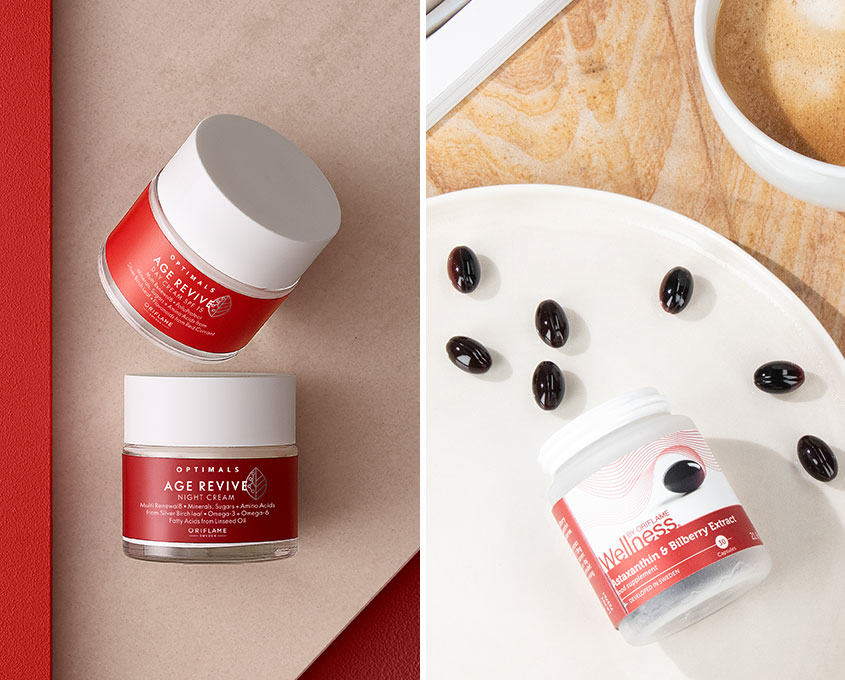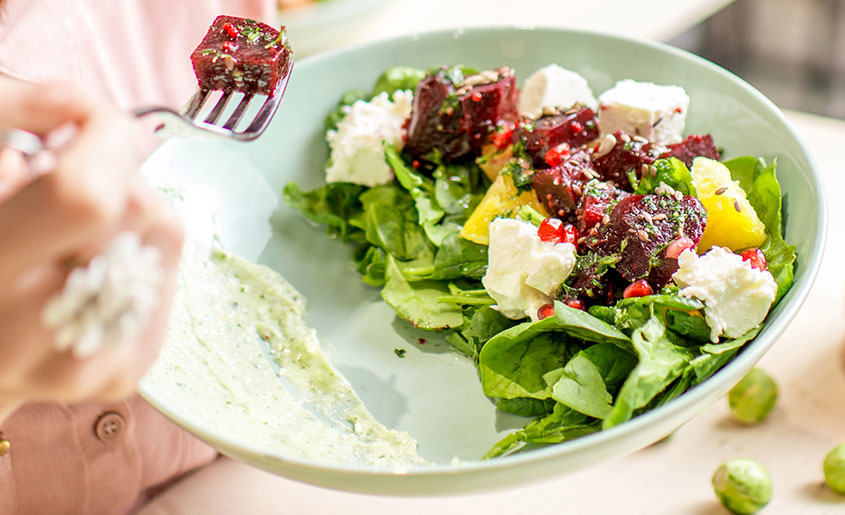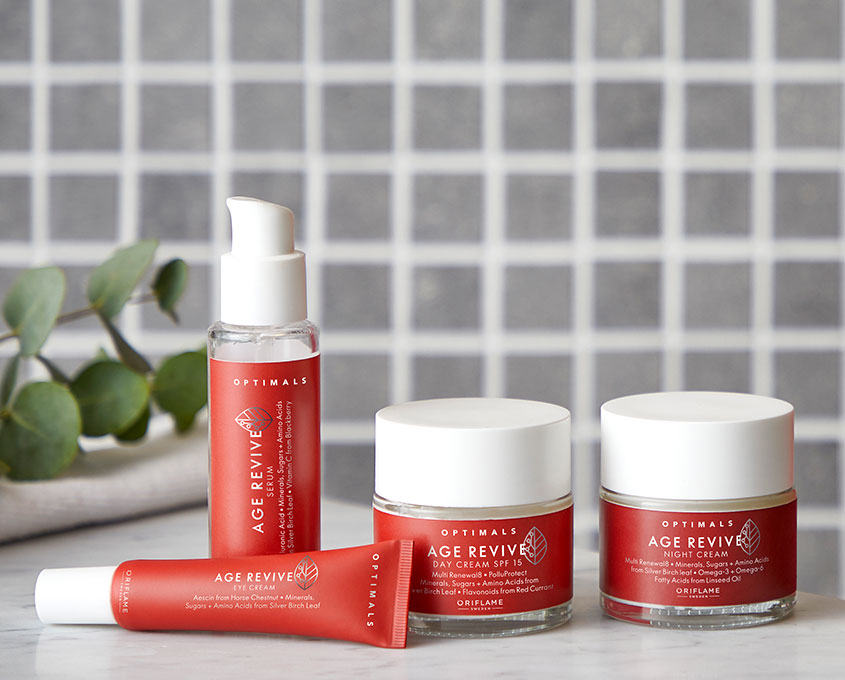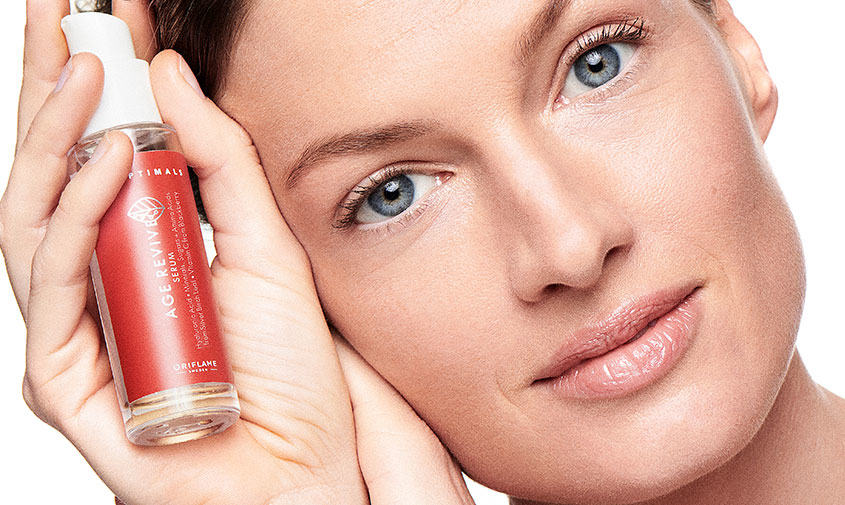
AGEING SIGN: DEHYDRATION
What’s happening: In your youthful years, think early twenties – your skin is plump and smooth, but with time it produces fewer cells, the skin becomes thinner and less resilient and begins to look dull or dehydrated. Dryness worsens later in life due to the loss of oil glands. For women a hormonal shift occurs during and around menopause as oestrogen decreases and androgen levels increases and as a consequence your skin can suffer moisture loss and more.
Solution: Dehydration is a common sign of ageing, but it’s never too late to give your skin the moisture it needs. Proper hydration is essential to promoting a healthy skin barrier. You’ll want to choose an age-appropriate moisturiser and incorporate it into your routine twice daily. Moisturising with a day cream that contains amino acids, antioxidants, minerals, and sugars will plump skin cells, targeting multiple signs of ageing.
AGEING SIGN: WRINKLES + FINE LINES
What’s happening: Sun, time, genetics – these are all skin ageing-contributing factors. In your 40s, you produce less collagen than you did in your 20s, which means your skin naturally becomes thinner, causing it to lose firmness and elasticity. But your lifestyle also plays a part. Lack of sleep, smoking, and even high sugar consumption can further free radical-induced damage and lead to more wrinkles and sagging skin. A healthy diet is an essential complement to your skin care routine.
Solution: It’s common knowledge, the right dietary nutrition can help you look and feel your best. Well, these same principles can be applied to your skin care. Ingredients matter and can help to add nutritional value topically to your skin. We can’t encourage wholesome nutrients enough! Again think, antioxidants, vitamins, minerals, amino and fatty acids because, putting more goodness into your skin care routine will help you get better results out. When it comes to your night cream look for a moisturiser that works to nourish and repair. Essential fatty acids (like omega-3 and omega-6) have a structural function within the skin that helps to nourish and replenish the skin barrier simultaneously – improving skin resiliency with time.
AGEING SIGN: DARK CIRCLES
What’s happening: Whether it’s lack of sleep, too much salt in your diet, not enough water intake, staring at a screen for too long or all of the above, these enablers are likely resulting in unwanted dark circles and puffiness under the eyes. The main cause of dark circles is thinning skin and weakened capillaries, which can make your eyes appear tired and aged.
Solution: Aside from the obvious – drink more water and try to get 8 hours of sleep – you’ll also want to invest in an eye cream to help improve signs of ageing and protect the delicate eye area from damage. Caffeine can help to tighten the skin and reduce puffiness. While Aescin, a microcirculation booster has the ability to strengthen capillary walls and works to brighten the under eye area. Try, Age Revive Eye Cream with Aescin from Horse Chestnut. An added bonus, this eye cream cools on contact leaving skin feeling instantly refreshed and looking radiant!

AGEING SIGN: DULLNESS
What’s happening: Now is the time to exfoliate. As you age, the skin texture (and tone, but more on that below) takes on a different feel. The build-up of old cells can lead to rough skin and a dull complexion.
Solution: Exfoliating weekly with a mask or scrub will help smooth away impurities and imperfections. And to address dullness daily, use a serum to boost skin radiance. Products that include vitamin C, alpha hydroxy acids (AHA), lactic acid, and glycolic acid will help gently resurface your skin and increase cell turnover. Ingredients like these can make your skin more sensitive to sunlight. So, remember to carefully follow instructions on the packaging. And remember to use a broad-spectrum sunscreen every day to protect your healthy-looking glow from all light sources.
AGEING SIGN: HYPERPIGMENTATION
What’s happening: Hyperpigmentation is caused by the overproduction of melanin in the skin. It can happen to any skin type, at any age. Though you’re more susceptible to skin discolouration as you get older, due to your skin’s thinness and inability to regenerate as well as it did in your youth.
Solution: Protection is key to preventing future dark spots — making SPF a no-brainer. But to tackle skin discolouration, you’ll want the help of hard-working ingredients. Which brings us back to antioxidants – skin care superheroes! Antioxidants can prevent free radical destruction like sun damage, plus are known to help improve skin firmness by rebalancing collagen production and interrupting the cascade of damage.
You can never have too many antioxidants in your skincare routine! Products sourced with plant-based ingredients can contain greater concentrations of antioxidants. To up the ante on your skin’s nutritional intake, start checking your skin care ingredients today for these common antioxidants: vitamin C, niacinamide (vitamin B3), retinol (vitamin A), polyphenols and last but not least flavonoids. Some flavonoids called anthocyanins can even have a greater antioxidant proficiency than vitamin C or vitamin E!
To target and improve visible signs of ageing with balanced skin nutrition try Optimals Age Revive.




